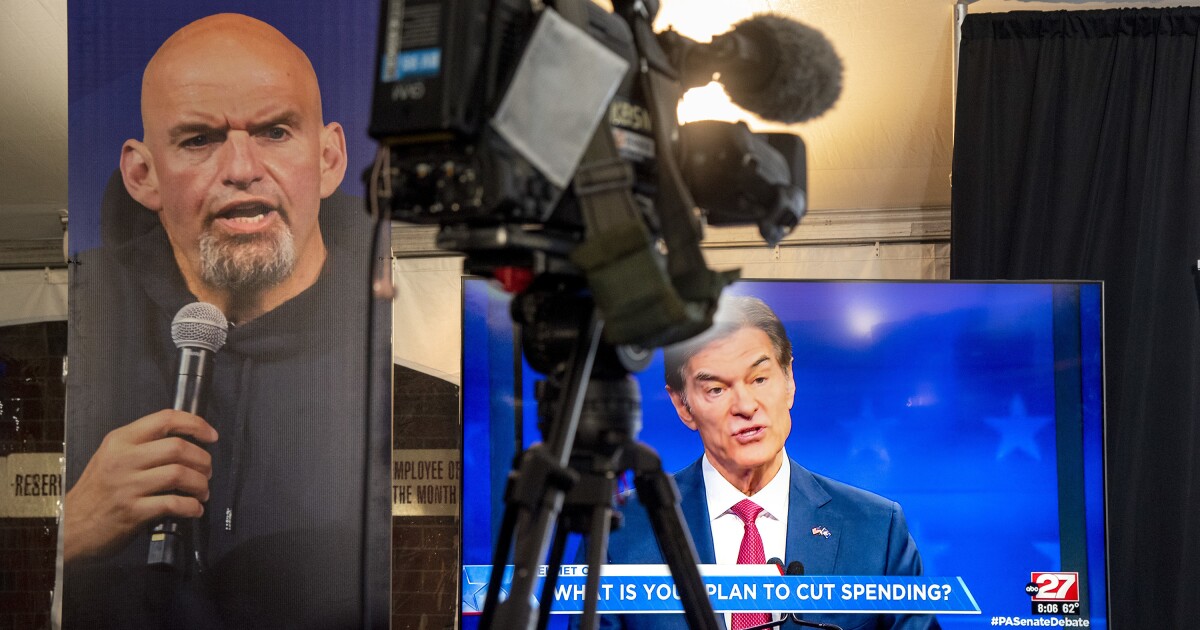

All eyes are on the Senate Tuesday as voters finish casting their ballots this midterm election cycle. Given its 50-50 split, a single seat could tip the balance of power in the upper chamber.
Of the 35 Senate seats up for election on Tuesday, four are considered toss-ups, 11 favor Democrats, and 20 favor Republicans, according to the Cook Political Report.
WHITE HOUSE WON’T NAME REPUBLICANS BIDEN BELIEVES WILL REJECT ELECTION RESULTS
Republicans entered the cycle defending 21 seats, versus the 14 seats Democrats hope to maintain. Unlike the House, which Republicans are expected to retake, the outcome for Senate control is less clear, although forecasts favor Republicans slightly.
Here is the Washington Examiner’s rundown of all Senate contests. As each race is called on election night, this list will be updated. The winner of each state will be bolded.
Called races
Kentucky
Sen. Rand Paul beat a spirited challenge from Democrat Charles Booker.
South Carolina
Sen. Tim Scott won a second term, beating Democrat Krystle Matthews and independent Larry Adams Jr. The race was rated “solid Republican.”
Vermont
Democrat Peter Welch beat Republican Gerald Malloy in the “solid Democrat” contest. The sudden retirement of the long-serving Sen. Patrick Leahy (D-VT) attracted widespread local interest in the race.
Outstanding races
Alaska
Incumbent Sen. Lisa Murkowski (R-AK) faced a stiff challenge from fellow Republican Kelly Tshibaka and Democrat Pat Chesbro. Under Alaska election rules, the top four primary contenders advance to the general election. Voters will choose between them via ranked choice voting. The race is considered “solid Republican.”
Alabama
In the Heart of Dixie State, Republican Katie Britt and Democrat Will Boyd fought to fill the seat vacated by outgoing Sen. Richard Shelby (R-AL) in the “solid Republican” state.
Arizona
Featuring a battle between populist conservative Blake Masters and incumbent Sen. Mark Kelly (D-AZ), the Arizona Senate race tightened demonstrably in the final sprint, with Kelly maintaining a slim lead in the toss-up race, according to the RealClearPolitics polling average.
Arizona, which was once a reliably red state, has trended purple in recent elections and has been a top target for Republicans eager to regain lost ground.
Arkansas
In ruby-red Arkansas, incumbent Sen. John Boozman vied against Democrat Natalie James and was widely considered the front-runner in the “solid Republican” race.
California
Incumbent Sen. Alex Padilla first ascended to his post after Kamala Harris vacated the seat to become vice president. Padilla faced a challenge from Mark Meuser in a “solid Democrat” contest.
Colorado
Colorado’s Joe O’Dea, who survived a Democratic spoiler campaign for the GOP nomination, ran a fierce race against former presidential candidate and incumbent Sen. Michael Bennet (D-CO) in a “lean Democrat” contest, per the Cook Political Report.
Connecticut
In his quest for a third term in the Constitution State, incumbent Sen. Richard Blumenthal (D-CT) jousted with Republican Leora Levy and had been widely forecast to win the “solid Democrat” race.
Florida
In the final days of the midterm race, incumbent Sen. Marco Rubio (R-FL) opened up a considerable polling lead over Rep. Val Demings (D-FL) in a contest the Cook Political Report deemed “lean Republican.” Demings had significantly outraised Rubio and mounted a scrappy campaign against him, but the Sunshine State has trended red recently.
Georgia
Few Senate races this cycle have taken as many twists and turns as the toss-up Georgia showdown between Republican Herschel Walker and incumbent Sen. Raphael Warnock (D-GA). A seasoned orator from the famed Ebenezer Baptist Church, Warnock first won the seat during a special election runoff that took place after the 2020 election.
Ever since his upset victory back in 2020, Republicans have long had their sights trained on a pickup in the Peach State, once a decidedly red state. Polling had consistently oscillated between the duo and often remained within the margin of error.
During the homestretch of the contest, Walker was rocked by reports that he pushed two ex-girlfriends to have abortions — an accusation he adamantly denies. Under Georgia rules, candidates must clinch a majority in order to win outright. Candidates who fall short of 50% must vie in a runoff election.
Hawaii
The Aloha State Senate battle featured a showdown between incumbent Sen. Brian Schatz (D-HI) and Republican Bob McDermott. The contest was considered “solid Democrat.”
Idaho
First elected in 1998, incumbent Sen. Mike Crapo (R-ID) pursued a fifth term in the upper chamber against Democrat David Roth and third-party hopeful Ray Writz. The contest was considered “solid Republican.”
Illinois
In the blue Land of Lincoln State, incumbent Sen. Tammy Duckworth (D-IL) faced a challenge from Republican Kathy Salvi but had been heavily favored to win.
Indiana
Incumbent Sen. Todd Young (R-IN) ran for a second term against Democrat Thomas McDermott Jr. and Libertarian James Sceniak in a “solid Republican” race.
Iowa
At 89, incumbent Sen. Chuck Grassley (R-IA) pursued an eighth term as senator against Democrat Mike Franken in what was considered a “solid Republican” race.
Kansas
With a hot gubernatorial race brewing in the background, incumbent Sen. Jerry Moran (R-KS) was favored to prevail in his quest for a third term in office against Democrat Mark Holland and Libertarian David Graham.
Louisiana
Dubbed a “thespian” by some of his Republican colleagues and renowned for his ability to turn phrases, incumbent Sen. John Kennedy (R-LA) ran against Democrat Gary Chambers for a second term in the upper chamber. The race was ranked “solid Republican.” Candidates must capture a majority of votes, or else the race will advance to a runoff.
Maryland
In the “solid Democrat” Little America State, Sen. Chris Van Hollen (D-MD) vied for a second term against Republican Chris Chaffee.
Missouri
Vacated by incumbent Sen. Roy Blunt (R-MO), the Senate race for the “solid Republican” seat featured a contest between Republican Eric Schmitt and Democrat Trudy Busch Valentine in the Show-Me State.
Nevada
Despite Democrats winning recent presidential elections and enjoying political power at the governor and state legislative level in bellwether Nevada, polling had shown a fierce toss-up race between incumbent Sen. Catherine Cortez Masto (D-NV) and her Republican rival, Adam Laxalt.
With about just shy of a third of the Battle Born State’s population Hispanic or Latino, Nevada became a test of whether the GOP is making strides with the Latino community. Laxalt had eked out an edge in the RealClearPolitics average on the eve of Election Day.
New Hampshire
Widely viewed as one of the most endangered Senate Democrats, incumbent Maggie Hassan (D-NH) faced a spirited challenge from Republican Don Bolduc. She held a slim lead over him in polling averages, and the race was considered “lean Democrat.”
New York
Following speculation of a primary challenge from Rep. Ocasio-Cortez (D-NY) that did not materialize, Senate Majority Leader Chuck Schumer (D-NY) squared off with Republican Joe Pinion in the general election race, deemed “solid Democrat” by the Cook Political Report.
North Carolina
Democrat Cheri Beasley and Republican Rep. Ted Budd (R-NC) vied in the competitive race for North Carolina’s Senate seat, which was ranked “lean Republican” by the Cook Political Report. Budd held a consistent lead in polling.
North Dakota
Democrat Katrina Christiansen challenged incumbent John Hoeven (R-ND) for the Senate seat he first won in 2010. He was widely forecasted to sail to victory over her in the “solid Republican” race.
Ohio
Forecasters were bearish on Rep. Tim Ryan’s (D-OH) prospects against Republican J.D. Vance, who consistently led him in polling. The contest was a “lean Republican” race, according to the Cook Political Report.
Oklahoma
The sudden retirement of Sen. Jim Inhofe (R-OK), widely regarded as one of the most conservative voices in the Senate, prompted a special election in Oklahoma featuring Republican Markwayne Mullin and Democrat Kendra Horn. The winner of the race will face reelection in 2026.
Oklahoma
Against the backdrop of a nationally watched gubernatorial matchup, Democrat Madison Horn challenged incumbent Sen. James Lankford (R-OK) in his quest for a second full term in the lower chamber. The race was considered “solid Republican.”
Oregon
Incumbent Sen. Ron Wyden (D-OR) vied for a fifth full term against Republican Jo Rae Perkins in the “solid Democrat” state.
Pennsylvania
Both parties waged a fierce war over the Pennsylvania Senate seat vacated by outgoing Sen. Pat Toomey (R-PA), who announced his retirement back in 2020. The toss-up contest was marked by a bruising slugfest between Republican Dr. Mehmet Oz and Democrat John Fetterman.
For months, Fetterman held a commanding lead over Oz, but that quickly began to dwindle amid mounting concern about Fetterman’s health, which was catalyzed by his debate performance last month.
South Dakota
Incumbent Sen. John Thune (R-SD) battled Democrat Brian Bengs for another term as senator in a race rated “solid Republican.”
Utah
In one of the most striking political moves of the cycle, Utah Democrats opted not to run a candidate from their party against incumbent Sen. Mike Lee (R-UT), betting that independent contender Evan McMullin would fare better. Polling pegged Lee with a sizable lead, and the race was considered “likely Republican” by the Cook Political Report.
CLICK HERE TO READ MORE FROM THE WASHINGTON EXAMINER
Washington
Behind the scenes, Democrats reportedly scrambled to shore up Sen. Patty Murray (D-WA) in her race with political newcomer Republican Tiffany Smiley, who trailed the incumbent in polling. The Cook Political Report rated the race “likely Democrat.”
Wisconsin
Incumbent Sen. Ron Johnson (R-WI) squared off with Democratic Lt. Gov. Mandela Barnes in the Badger State race, which the Cook Political Report deemed “lean Republican.” Johnson was widely regarded as one of the most vulnerable incumbent Republican senators this cycle but ultimately held a lead in polling averages.






